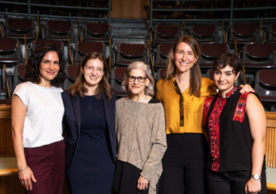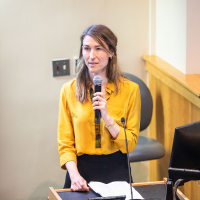
Yale School of Nursing (YSN) Nurse Midwifery/Women’s Health Nurse Practitioner student Grace Lesser ’25 MSN, MBA, MPH was recently selected to present her piece “Belly of the Whale” at the 7th Annual Special Medical Grand Rounds: Stories of Yale Internal Medicine on June 15.
Lesser describes caring for a patient whose body has rejected a heart transplant and has remained in the hospital for more than a year.
“I think of a poem I once read about ways to pass the time in the belly of a whale: Measure the walls, it said. Notch the long days. Try to be very quiet, and listen for the sound of gears and moving water. Listen for the sound of your heart. I think of you in the belly of this whale, notching the days, staying very quiet.”
The entire essay is reproduced below.
Belly of the Whale
 It is my job to care for you today. As a nursing student, my primary job is to learn from your condition, to shadow the nurse assigned to your care, but I feel sure I can do more.
It is my job to care for you today. As a nursing student, my primary job is to learn from your condition, to shadow the nurse assigned to your care, but I feel sure I can do more.
Your room is silent except for the machines humming, and I try not to fill the space with chatter but I can’t help myself. Such a beautiful family you have! I croon, gesturing towards the photo of you in a tuxedo, standing proudly beside your daughter at her wedding. Your family’s Christmas card is tacked beside a Nature Conservancy calendar, each day crossed off like my children count the days in school, so they know what comes next. I recognize that bodily consent is the only power you have anymore, so I wait for your permission to funnel a soupy mess of nutrition via the hole in your stomach. You have no words but when you purse your lips to give me the go-ahead, I feel validated, somehow. That perhaps you do choose this.
I heard the story of your demise before I met you. A failed heart transplant. A heart rejected. You had gone in for a procedure this hospital had performed hundreds of times — perhaps you were its 500th, marked by the press release last year! — but you never left. I was told that when your body had started fighting the foreign heart, when your breath had become shallow and your balance weak, you had asked to die. Perhaps you had pleaded to follow in the footsteps of the donor whose brain had gone dark and who had offered their beating heart to you. Perhaps someone told you then that there’s always hope, that it’s worth the fight. And so you’re held hostage in this place that preserves time. No one here dies unless we let them.
It is our duty to wash your body and to pack your wound today. Your eyes are the only mobile part of you, and I notice they are darting to follow the nurse’s movements as she fills an industrial plastic pail with water, as she collects the hospital-grade pink liquid soap. I pull the sharp edges of your waist towards me so the nurse can clean the wound that tunnels deep into your backside. Your body is “pear shaped”: your middle is thick like the suburban Dad I know you once were, yet your ankles thin enough for me to wrap my forefinger and thumb around them. Our faces are but a foot away from each other, you and I, but we mutually avoid eye contact as your pressure ulcer is filled with gauze. We want it to heal from the inside out, I can hear the nurse chatter, teaching me about wound care. I bend at my knees to hold your leathery body up and I’m surprised by your weight, your muscles atrophied and coagulated around the bones. Their hardness reminds me of my breasts, engorged in the early days of breastfeeding. Like rocks within my skin.
You’ve been here for 368 days. Who were you before your heart failed, before you were told that medicine would save you? Who were you when you could bathe yourself, before the cottage cheese yeast accumulated in your armpits? Your wife comes every afternoon to sit beside you, her yellow hair blending into the gauzy yellow gown she dons before entering your room, protecting herself from the viruses you’ve collected here. She is an overseer, one hand tapping on her phone and the other gripping the metal rail pulled up high beside you, preventing a fall. As if you could move of your own volition.
I think of a poem I once read about ways to pass the time in the belly of a whale: Measure the walls, it said. Notch the long days. Try to be very quiet, and listen for the sound of gears and moving water. Listen for the sound of your heart. I think of you in the belly of this whale, notching the days, staying very quiet. You have a tracheostomy to deliver oxygen to the lungs which fail you and a ventilator to breathe on your behalf. A bag collects stool at the end of your bed, accumulating that which you cannot control, exuding a stench I’m not sure you can smell. I think of your heart which refuses to heal from the inside out. This floor is a living graveyard, the nurse muttered earlier today. She’s 15 years into tending it.
My final task is to give you antibiotic eye drops, prophylactic to prevent the next emergency. When I ask you if it’s okay for me to administer them, you shake your head vigorously but the nurse encourages it: Take one, please just take one. You grip your eyes shut, anticipating it’s a fight you’ll lose. I think of my two year old, who was recently sick but refused to take Tylenol by locking his lips together. At the time, I distracted him by pretending to be a thirsty rhinoceros and he giggled joyfully, open-mouthed just long enough to let the pink liquid in. Today, I want your active consent so badly, and yet I force your swollen eyelids apart, just enough to catch a slit of a pupil and get one drop in. There’s no distance from the belly of the whale today. Your lids snap shut again.
When I restore your glasses, I notice the lenses are covered with oil and flakes of skin. I ask if I can clean them: Begging for forgiveness, desperate for connection. Your eyes flicker with surprise at my offer while you nod your chin, and my heart skips a beat. All I can find in your room is a dry wipe but I scrub your lenses from front to back and top to bottom, inside and outside, long after the nurse leaves. Your body is clean and your wound is packed, but cleaning your glasses feels like my one true act of service today. I’m proud that I noticed how dirty they were. It’s the little things, I think to comfort myself. How satisfying it will be to see again.
